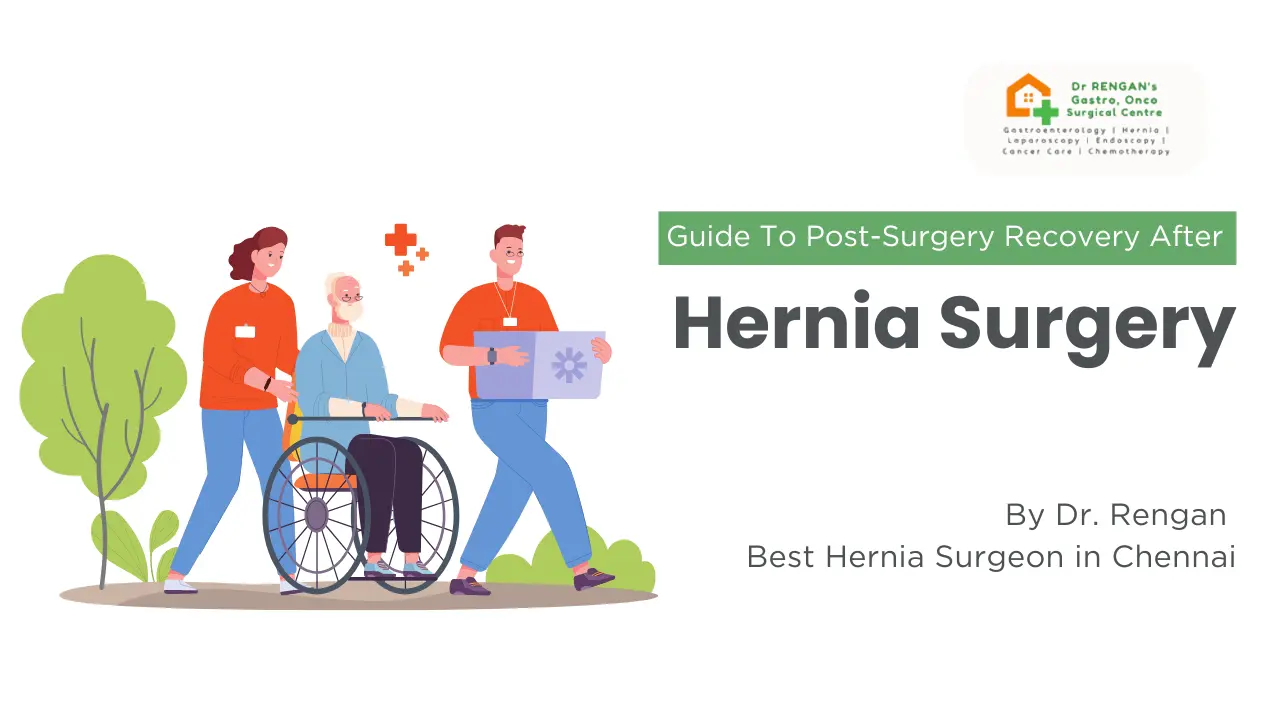
Post-Surgery Recovery Guide for Inguinal Hernia Repair.
Inguinal hernia surgery marks a significant step towards improving your health and quality of life. Recovery after the procedure is a gradual process, requiring care and patience. With expert guidance from Dr. Rengan, recognized as the best hernia surgeon in Chennai, you can navigate the recovery journey confidently.
Understanding Inguinal Hernia Surgery
An inguinal hernia occurs when tissue pushes through a weak spot in the groin muscles. Surgical repair is the most effective treatment, with two primary methods: laparoscopic surgery and open surgery. The choice depends on factors such as the hernia size, patient health, and surgeon recommendation..
Key Differences Between Laparoscopic and Open Surgery
-
- Procedure: Minimally invasive, using small incisions, a camera, and specialized instruments.
- Recovery Time: Typically faster, with less postoperative pain.
- Scarring: Minimal, as the incisions are small.
- Suitability: Ideal for bilateral hernias or recurrent cases.
Open Hernia Surgery
-
- Procedure: A single larger incision in the groin, directly repairing the hernia with or without a mesh.
- Recovery Time: Longer than laparoscopic surgery, with more localized pain.
- Scarring: More visible scar due to the larger incision.
- Suitability: Often recommended for large hernias or patients unsuitable for general anesthesia.
With either method, following post-surgery instructions is key to a successful recovery from hernia Surgery.
Immediate Post-Surgery Care to Improve Hernia Surgery Recovery Time
In the first 24 hours, rest and hydration are crucial. Common effects of anesthesia, such as drowsiness or nausea, usually subside quickly. Patients should avoid strenuous activities and monitor for signs like fever, excessive swelling, or severe pain, which may delay hernia surgery recovery time.
Pain Management After Hernia Surgery
Dr. Rengan may prescribe medications to ease pain and inflammation. Always take them as directed. Natural remedies like cold packs and proper resting positions can provide additional comfort. If the pain feels abnormal or persists beyond the expected timeframe, seek medical advice.
Diet and Nutrition to Support Hernia Surgery Recovery
A nutritious diet accelerates healing and may help shorten hernia surgery recovery time. Focus on:
-
- High-fiber foods: To prevent constipation, which can strain the surgical site.
- Lean proteins: Essential for tissue repair.
- Hydration: Drink plenty of water to maintain overall health.
- Avoid spicy or bloating-inducing foods that may cause discomfort.
Physical Activity after Hernia Surgery
Movement is essential for recovery but should be introduced gradually. Begin with light walking to improve circulation and prevent stiffness. Avoid lifting heavy objects, intense workouts, or activities requiring core strain for at least 4–6 weeks or as advised by Dr. Rengan.
Incision Care After Hernia Surgery
Proper care of the surgical site is critical:
-
- Keep it clean and dry: Avoid soaking in water until stitches are removed or healed.
- Monitor for infections: Redness, pus, or unusual warmth at the site requires immediate medical attention.
- Follow surgeon’s instructions: Regularly inspect the area and follow up as scheduled.
Resuming Work and Routines
The time to return to work depends on the nature of your job:
-
- Desk jobs: Typically within 1–2 weeks.
- Physical labor: May require up to 6 weeks or more, depending on the demands.
Communicate with Dr. Rengan to determine the right timeline for your specific needs after hernia Surgery.
Long-term Recovery Tips After Hernia Surgery
Consistency is the cornerstone of successful recovery.
-
- Attend all follow-up appointments with Dr. Rengan for progress assessment.
- Gradually incorporate light exercises like walking or yoga to strengthen the core.
- Adopt a healthy lifestyle to prevent recurrence, including weight management and avoiding smoking.
All these help minimize complications and promote optimal hernia surgery recovery time.
Do’s and Don’ts During Recovery
Do:
-
- Follow your prescribed medication schedule.
- Wear loose-fitting clothes to avoid pressure on the surgical site.
- Practice light movements to prevent stiffness.
Don’t:
-
- Strain during bowel movements; use stool softeners if needed.
- Lift objects heavier than 20 kilograms.
- Ignore symptoms of complications, such as swelling or fever.
Emotional and Psychological Recovery and Its Impact on Recovery Time:
Surgery can impact mental health. Feeling anxious about recurrence or limited activity is normal. Engage with loved ones, join support groups, or consult a counselor to ease these concerns. Remember, recovery is a temporary phase.
When to Consult Dr. Rengan
Contact Dr. Rengan if you experience:
-
- Persistent pain or swelling.
- Fever above 101°F.
- Unusual discharge from the incision.
Early detection of complications ensures swift resolution and a better outcome for your hernia Surgery.
Conclusion
Recovering from inguinal hernia surgery requires patience, adherence to medical advice, and support from an experienced professional. With Dr. Rengan’s expert guidance, your journey to recovery is in safe hands. Recognized as the best hernia surgeon in Chennai, his approach combines advanced techniques with compassionate care to ensure optimal results.
Frequently Asked Questions
Q: How long does it take to recover fully after hernia surgery?
A: Full recovery typically takes 4–6 weeks, with a gradual return to normal activities.
Q: Can I drive after hernia surgery?
A: The risk is low, especially with proper postoperative care and lifestyle adjustments.
Q: Is swelling normal after hernia surgery?
A: Mild swelling is common and should decrease within a week.
Q: When can I resume exercise?
A: Light activities like walking can begin within days, but wait 6 weeks or more for intense exercises.
Q: Why should I choose Dr. Rengan for my hernia surgery?
A: As the best hernia surgeon in Chennai, Dr. Rengan ensures advanced surgical techniques, personalized care, and optimal recovery plans.
Q: What’s the risk of hernia recurrence?
A: The risk is low, especially with proper postoperative care and lifestyle adjustments.

About the author | Berlin Sharmila (Senior Content Editor)
She is a Senior Content Editor with experience in digital marketing and SEO, creating engaging content that connects with readers. Outside of work, she enjoys exploring the latest in digital media.






